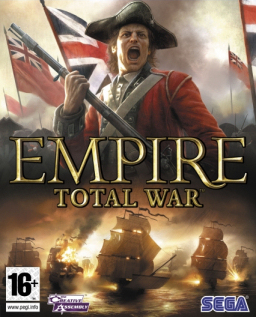"'The death of one man is a tragedy, the death of a million is a statistic' - Joesph Stalin, 2012"
A quote that is constantly attributed to Joesph Stalin but I'm pretty sure he never said that. I don't think he even knew English all that well. I'd imagine that whatever he said was in Russian, and maybe the translation is so loose there's a connotation we're not getting. I'm sure he did say it in 2012, tho, and that's the important thing. I'm pretty sure he'd get a kick out of Empire: Total War too, because it's pretty fun for the most part, and he can have all sorts of fun out of crushing Georgia.
But I'm not Stalin so I have to use this game for slight different purpose. I've always considered strategy, and specifically historical-strategy games to be in a unique position in terms of presenting an experience to the player as a learning and relational tool. Empire, as the name suggests, is about an empires at war; a hi-fi look at 1700 Europe (as well as the Near East, North Africa, India, and early Americas) with the ability to command your empire as seen fit. The relational tool comes with the construction and domestic issues of your nation, do you allow for revolution, maximizing happiness but possibly destroying your wonderful cabinet, or do you retain your monarchy, destroying the lower class but retaining world class military genius? Do you create hundreds of schools, furthering enlightenment thinking and improving market efficiency, at the risk of ensuring that previously mentioned reform, or do you keep an "underdeveloped" (in a traditional Western sense) mass that are brilliantly tactile farmers and iron workers. It's in these decisions that Empire becomes more than just a waste of time but a functional tool for understanding the struggle of power?
However, it's hard to determine if it's a good one. The biggest hurdle, obviously, is the lack of supposed empathy. It's nearly impossible to feel for the unhappy masses in the game, because there's an obstacle that comes in designing a method of "feeling" for a person that has no effect on the way the game is played, and all "care" for them comes from outside of the player's function as a "player of the game". Perhaps, however, this is the idea. The death of a million is a statistic. You don't feel anything for the 11 million Hindustan residents, because they are faceless numbers. You make them happy, and you get a good number. You make them sad, you get a bad number, which could eventually lead to revolt. When it comes down to it, everything is subject to selfishness, because the games explicit desire is to take over X many regions and keep them held. All else done is a backhanded way to appease just enough to make profit. This is a slight problem with the design, because you're never encouraged to LEAD, only CONQUER. Everything is pushed forward in the game, with the only time for introspection coming in the period after conquering, while you conquer your next area, when you need to keep your new region just happy enough to not revolt.
Regrettably, I have to cast that off as just a function of strategic, rather than the relational tool I suggest, but whatever, if you want to do that play Tropico, this is WAR man not just any war: TOTAL WAR. I played Spartan: Total Warrior before I played any Total War game, and if you know me I liked that game quite a bit. There was a heavy clash to every battle that escalated from the singular soldier to a battlefield of able-bodied men, all doing their damnedest to kill their enemy before their enemy can do the same. Perhaps what was most intriguing about it, was that that was true for every soldier in the game. From ally fodder to the strongest enemies, they worked with a motive that seemed wholly independent of a game program. If there was anything I was wanting from Total War, it was to see the kinetic impact of a battle and be able to get the same sense of urgency the warriors should.
It succeeds, to an extent. When you launch a cannon shot into a castle wall, the enemy scatters around a bit to protect themselves from the onslaught. When you surprise a group of musketeers with cavalry that came from out of their sight, there's a scramble from them to keep position. When you clash head on some weak infantry with elephant mounted generals, watching the bodies fly gives you the same meditative moment of shock and awe that you can see from the battlefield. There are moments of tedium or frustration, but for what it is, the automated combat works wonders, and really provides great satisfaction for a crafty tactician.
Basically, what I'm saying is that Empire: Total War is pretty cool. It would be much cooler if it was all online, with players as monarchs, cabinet members, generals, agents, and representatives of the peasants. Every action in the flowing market of the game has a recognizable affect on your populous, and you can feel some slight empathy for all under your wing (not perfect, Day Z still doesn't have a good community for example). When battles take place, you have the general talk about deployment, with every soldier given his own battalion he's responsible for. The general gets a top down view along with his view of his singular player (Wii U fo sho), and every player is given their view, a diagram of where they are in the general's plans, and a Mount and Blade style command of his troop (hot keys for simple maneuvers). Then, every individual players alongside and outside of their own troops with gameplay similar to Spartan: Total Warrior. And it'd be the best game ever.
But for now, Empire is pretty cool.
4/6


No comments:
Post a Comment